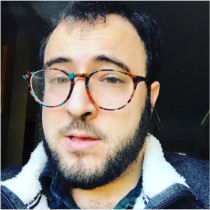
The following is a guest post by Sam Heyman, whose short story “Roses” appeared in issue 21 of Typehouse.
______________________________________
During the fall semester of my senior year of college, I was in the eye of a storm. Specifically, a perfect storm of intersecting liberal arts topics and a looming mania, through which my guiding light was storytelling. I finished my first full length play that semester, as well as a TV pilot in play’s clothing—but interestingly, the work that emerged from that period most intact was “Roses.”
“Roses” grew from a seed planted in my mind after reading Hideko Abe’s Queer Japanese for a linguistics research project. It was a small but rich book, and it didn’t take me long to find something of interest. The first chapter of Queer Japanese concerns gay advice columns, such as those found in G-Men, a now-defunct Japanese gay men’s magazine. Getting a chance to read about the true experiences of queer people in Japan sparked a familiar compulsion in me.
“There’s a story there,” I said aloud—a phrase I often use when an event or situation tempts me into plumbing it for meaning, emotion, truth. There are many stories that could have emerged from my reading of Abe’s lovingly crafted research text, but the one I chose to follow was Kenta’s story; a story about a young gay man coming to terms with his identity, while contending with the reality that he may not be the only queer person in his immediate family.
Throughout “Roses”, I found ways to incorporate the lessons that Queer Japanese had taught me, while also reflecting on the stories of same-sex love and attraction that I had internalized when I was Kenta’s age. I knew there was no way that mere cultural appreciation would be sufficient grounds for me to write a story that was fully authentic to Japanese gay male experience, but I also knew that my goal was less about accuracy than truth.
The yaoi and bara manga that Kenta reads—that I, too, have read—is nearly always inaccurate, even when it isn’t explicit or pornographic. Yaoi is, in most cases, a fantasy genre dreamed up by straight, female manga artists rather than an authentic exploration of what it means to be gay. Bara, while it at least has congruous authorship, is aspirational and exaggerated in the way it depicts masculinity, men and sex between them. Though entertained, Kenta was made to feel inadequate by these stories, and I was too.
The story I sought to tell in “Roses” was one that spoke back to the manga of my adolescence. It is grounded in the words of real people, earnestly seeking advice for how to come out to their families and receiving a well meaning, if deeply sad response: “What they don’t know won’t hurt them.” It imagines a generation of queer youth that is unsatisfied with the fantasies they’ve consumed, and who crave a reality that, for all its blemishes, can at least afford the sweetness of love requited, the warmth of familial embrace. The truth it tells is hopeful, like a flower’s potential to bloom.
_______________________________________
Sam Heyman (He/Him, They/Them) is a gay nonbinary writer housed in Nashville, TN. His writing has been published in Hashtag Queer, Ordinary Space and, most recently, Typehouse. He hopes to create space for queer lives in literature and imagine, through storytelling, brighter tomorrows for humans of all stripes. Twitter: @sheymanCYCO